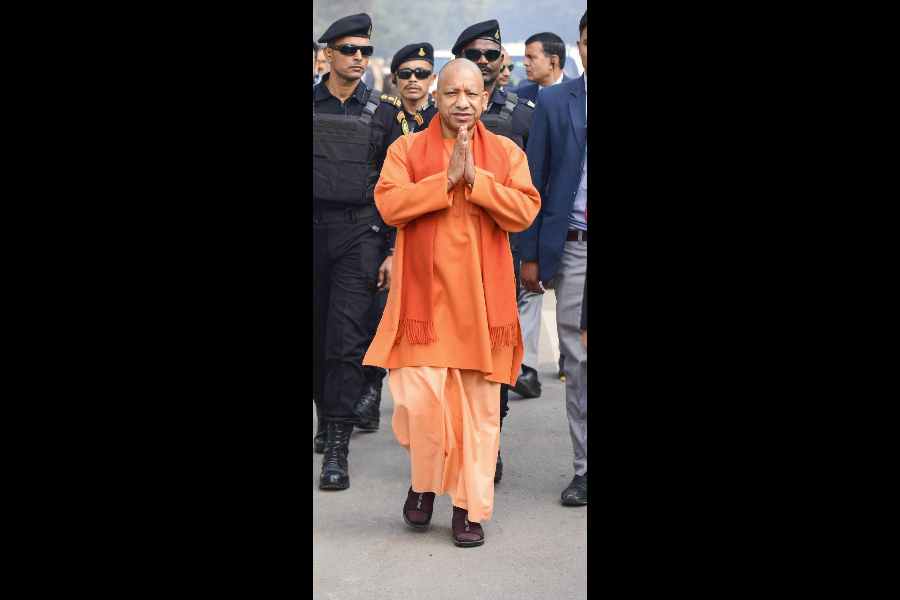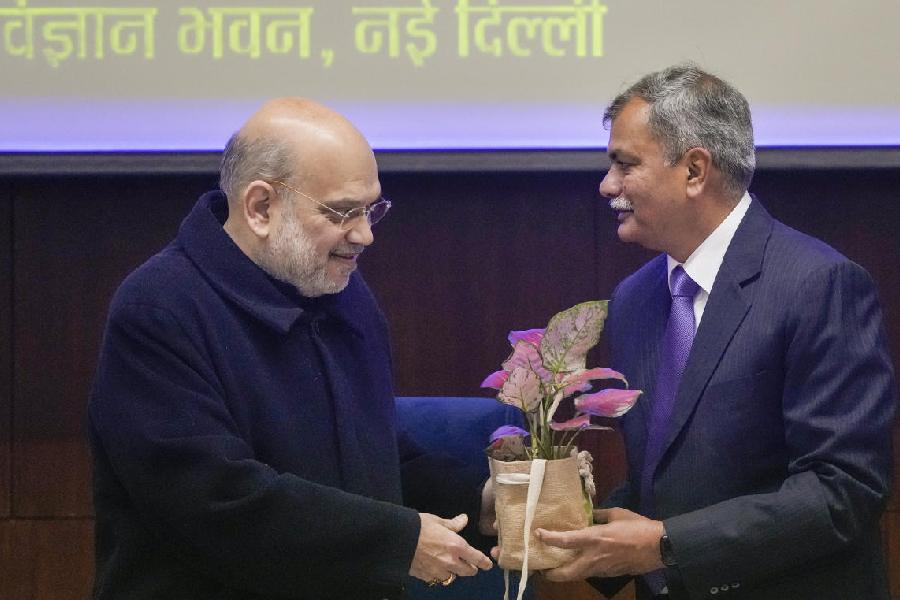The chief of Speciality Restaurants, Anjan Chatterjee talks from the heart but means business. In Calcutta to take stock of his various brands that dot the city, he spoke to The Telegraph about traversing the new normal and survival in 2020. Excerpts...
Is this your first time in Calcutta in the new normal?
Yes. If I don’t come here at least twice a month, I get withdrawal symptoms. Secondly, we have so many units here and it’s a big operational area. That’s why I generally check the properties, meet the property owners and my team. We are going through a critical time and they are also working against time and health hazards so I had to come and meet them and understand what’s going on. BARishh just opened, Hoppipola Sector V is going to reopen soon. It was important to review all the 35 units that we have… beyond a point it’s difficult to operate through Zoom calls.
Do you see any changes?
I am pleasantly surprised for two things — somehow or the other people seem to have understood the importance of the fact that they need to go on with their life and ensure that they are able take enough precaution. Everyone who is coming to the restaurant or mall, social distancing is broadly being followed. The spirit of Calcuttans can’t be hurt by a corona beyond a point. And I must compliment the government of West Bengal, though it’s nothing political. They have taken a very gradual and graded opening approach and have been able to control and communicate to people to stay safe while going on with your lives.
You brand Speciality Restaurants has outlets across the country and abroad. Do you notice any pattern when it comes to adapting to changes and the new normal?
Unfortunately, Bombay hasn’t reopened but in Delhi, Bangalore and Chennai for that matter, there has been a kind of understanding — slow, gradual movement of people but then in the beginning there’s a growth spurt… I would call it the revenge eating or revenge shopping. People are actually queueing up. The fact is that people are bound to go out and eat out, you can wear a mask on your face but not on your emotions. And food is all about emotions. Also, there are challenges in the short and mid-term. But that apart, we have to balance the act to encourage more people.
See, there are two ways of looking at it — of course, life is important and you will sit back and relax. In Calcutta, people have become responsible enough to move in an area ensuring that they don’t go too close to people. The malls have taken a lot of confidence-building measures. In cases like South City (Mall), they wouldn’t let you in unless you are wearing mask. If you are inside the mall, they will request you to wear a mask if you aren’t wearing one. See, it isn’t natural for a human to wear a mask, it’s a new environment and new normal. Interestingly, Puja is coming and you can’t take Puja out of a Bengali and hold them back. And, the spirit of Puja is more or equally important than staying at home. What I loved is the kind of confidence that has come in this city. The number of cases in the city compared to a Bombay or a Delhi, despite lifting of lockdown, has been controlled.
How was it starting operations of Speciality Restaurants?
We, in Speciality (Restaurants) took time to understand and accept the new normal because there are different types of protocols, there are human beings who are working and they need to get accustomed to the new normal. There’s a virus treatment that’s being done at the restaurants, ensuring that social distancing between the tables can be maintained. People are coming in and appreciating that. More and more people are thronging the restaurants. They need to have faith in the brand, I feel. Even if people have to spend a couple of hundred rupees more, they know that the food is safe and hygienically prepared. We are doing rapid antigen tests, all our staff has been tested, given accommodation that has been treated and sanitised. All our staff has been given adequate vitamin supplements. As they come in, there’s a check and it’s not just temperature. We have done a sort of doctrine… we have trained our people as paramedics during this period. They have done an online course for paramedics so they know how to check people in terms of not just temperature but other symptoms too.
Your brands have been in operation for decades but was there anything that caught you unawares, because of this unique situation?
We didn’t know how to respond. We had shut our restaurants on March 19, even before the nationwide lockdown started. We understood the responsibility that we weren’t able to handle this kind of a situation, we didn’t know what’s going on. We sent all the people home and asked them to be safe. We were in touch with them and helping them in our own best way. We wanted to get our system in place and figure out how to carry out the anti-virus treatments. It’s better to sacrifice business than do something shoddy.
Do you think that the revenue Sepciality earns through dine-in will be overtaken by delivery and takeaways?
Short and mid-term, yes. At the moment we are doing that. Almost double. There are many places where dine-in hasn’t started so naturally, in those places, delivery is more. We have started something called Speciality Kitchens where all our brands are listed. It has been easier for us to operate under one single kitchen because you can choose from a basket of brands there. I think short and mid-term delivery will be growing and the most important thing would be for us to give that confidence to the customers. The collective opportunity and the effort is very important. We have given so many packages to people… giving redemption coupons.
We used to do almost 100 per cent delivery because we were open. Now it’s come to almost 60-40... 60 is dine-in and 40 is delivery. It will soon become 50-50. There has been another change in the socio-economic pattern, where people are working from home. You know that you won’t be able to go out but you know that the food can come to you. This whole pattern is bound to be there and the relationship with the logistics partner, which are Zomato and Swiggy, will become more and more important. We weren’t a delivery company, our focus was on restaurants but we worked very hard and have created two verticals now. One is the original, fine-dine-in and the second has become a delivery vertical. We had to get our operations geared up for delivery, bettering the packaging and understanding all the factors that the delivery process has.
What direction do you see Speciality Restaurants going in?
My son, Avik (Chatterjee) is working on a delivery-first model but all these will take time to perfect. Any corporation is worth its salt when they take any crisis as an opportunity.
Which Sepciality brands are doing best in Calcutta right now?
Mainland China followed by Oh! Calcutta. We have started (Cafe) Mezzuna delivery and the response has been tremendously good. People are missing their favoured brands. I could see that people were waiting at Riyasat.
How are your brands faring in the international spaces?
It has been extraordinarily good in Dubai because the cases of corona were controlled well. Doha, too, has been good. Tanzania is good too. When it comes to London, fortunately we haven’t started Chourangi (Speciality Restaurant’s much-awaited venture in the UK) so we could actually wait because rest of London has picked up even though there has been a second wave. But central London has been challenging. We are looking at a launch in November-December or even January.
What, according to you, are the biggest challenges that lie ahead?
The biggest challenge is to get people to come for dine-in again because we can’t control the virus’s behaviour, but we can surely control ourselves regarding how to deal with it, as a corporation. The confidence building will take time and there will be challenges. We have the responsibility to ensure that we comfort the customer... for every delivery that we do above Rs 1,000, we are giving a large portion of a dessert for free or ensuring that a starter is free. We are ensuring that the guests have been taken care of in some way.
Are you in survival mode then?
Absolutely, but without compromising on safety and hygiene.
Lastly, what do you think the near future holds for the F&B industry?
It will be the survival of the fittest. At the end of it, that will be the real test of time. You need to be innovative, making it a little comfortable for their (customer) pocket. It’s a sustained effort that will be there for a long time.











